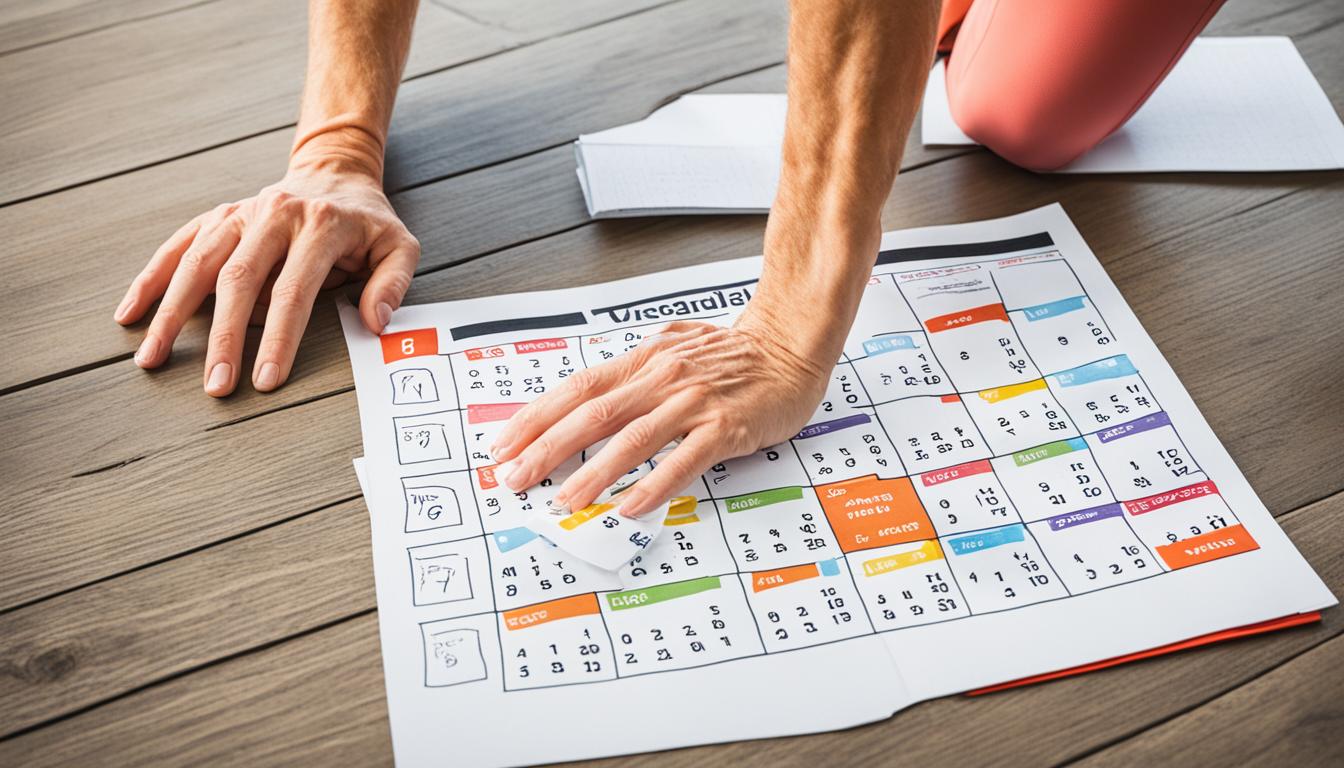A productive mindset is more than doing more tasks. It’s about being more efficient in everything. Knowing you can improve your productivity is a good first step. It puts you ahead of those who don’t see their own inefficiencies. To be more productive, avoid wasting time and set up a good routine. Focus on one task at a time to avoid distractions. Remember to take breaks to avoid getting burnt out. Always keep your goals in view to stay on track.
Organized people value their time highly. It’s essential to understand time management to use it fully. This control can make you happier. Owning your actions makes you feel in control of your life. Your hopes and dreams can push you to act.

Clear goals help you avoid putting things off and wasting time. Good habits need knowledge, desire, and skills to become routine. It’s key to cut out what doesn’t work to use time better. Knowing your body’s best times for work helps with productivity. It’s like how short bursts of effort and rest periods help both sprinters and marathoners.
Try the 70-20-10 rule: spend 70% of your day on big tasks, 20% on strategic thinking, and 10% on learning. Knowing if you’re a ‘maker’ or ‘manager’ helps plan your day for better productivity. Group similar tasks to work smoother and faster. Spending 10-20 minutes every Sunday planning the week helps direct your productivity. Set clear priorities to tackle important tasks first.
Understand the Psychology of Time Management
Understanding time management psychology is key. In “Secrets of the Millionaire Mind,” T. Harv Eker uses an analogy. He says life is like a tree. Our results are like fruits, coming from our mindset and thoughts. This idea shows why it’s important to work on our internal thoughts. It helps us manage our time better. Our mental energy and motivations affect our productivity, according to psychology of productivity.
Remote employees mix work with personal life, leading to stress. This can lower productivity. Research links personality traits like conscientiousness to better productivity. This means people who plan well, use their time better. For those who find time management hard, try setting small goals. This approach fights procrastination, says Brian Tracy. Following the “one-touch” rule and not over-committing are valuable tips.
Multitasking hurts productivity for about 97.5% of people. It’s better to focus on one thing at a time. Using mindfulness practices improves focus. This includes mindful work periods and meditation breaks.
The right environment is crucial, too. The Person-Environment fit theory says a good match reduces stress. This raises productivity. A supportive culture helps team members do well. Engaged employees stay longer with their companies. They achieve more, showing the benefits of a supportive workplace.
Tracking time properly also helps. Tools like “Desklog” give insight into how we spend our time. Celebrating small wins motivates us to keep going. Discover more on time management principles to make lasting changes.
Take Full Responsibility for Your Actions
Taking responsibility for what you do is key to being productive. It gives you control over your life, making you happier. Psychologists say that feeling in control makes people feel better overall.
Think of yourself as the CEO of your life. This way, you’ll be better at choosing your direction.

Why Responsibility Matters
A study on successful people found an interesting fact. 78% said managing their actions and time led to their success. Also, 72% believed that owning their choices was vital.
Having this ownership makes people feel capable, leading to good results. Effective time management is a key strategy for them. In fact, 84% of productive folks focus on managing their time well.
Actions and Outcomes
Studies show those who feel in charge are 65% more likely to succeed. Owning your actions, even when things get tough, is powerful. It shows you can change today and tomorrow.
90% of successful people align habits with their goals. This strategy is important for their productivity. In the end, this approach helps in setting suitable goals, making success rate jump to 89%.
Set Clear Goals and Priorities
Setting clear goals is key to being productive. It helps turn a tough journey into an easy path. This lets you use your time and resources well.
The Importance of Clarity
Clarity drives goal setting and task prioritization. Having specific, measurable goals makes sure your energy is used wisely. This approach helps with better planning, boosts productivity, and cuts down on delay.

Effective Goal Setting
Reaching a goal changes things for a bit. But, to avoid going back to old ways, keep trying. Focusing on a system helps with steady progress. It stops the back-and-forth of old habits after reaching goals.
Prioritizing Tasks
Choosing what tasks to do first is very important. Sort them by urgency and connection to your goals. This helps align your tasks with your main aims.
Avoiding distractions like social media makes you more productive. Mindfulness and meditation improve focus and reduce stress. This leads to better work flow.
Control Your Environment
Making your environment better can help you work more. By creating a good workspace and cutting distractions, you can work better. Things like having a comfy chair, tools nearby, and keeping noise away are important. They make a space that helps you stay focused and do well.
Having a place that helps you focus and keeps problems away is key. It can help just as much as wanting to do well can.
Creating a Productive Workspace
Start by making your workspace help you focus. Small things can make a big difference. Like comfy chairs and having what you need close by.
Research says that what’s around us can change how we act. For instance, putting healthy food on green plates made people take 30% more. Making important tools easy to get can also make working better and easier.
Eliminating Distractions
Cutting down on distractions helps keep you focused. Many times, distractions stop traditional ways to manage time from working. By stopping bad habits and making good ones easier, you make a space with fewer distractions.
For example, if it’s easier to do something good, you’ll likely do it more. Making it hard to do bad things helps too. This creates a space where you can stay focused and work efficiently.
Develop a Consistent Routine
Having a daily routine is essential for reaching your goals. Routines help you keep actions and priorities in line. About 40% of what we do each day is based on habit. This shows the importance of a good schedule. It helps save your mental energy for big decisions.

Being consistent is crucial for habit building. Many successful people start their day early. This early start prepares them for what comes next. They stress the importance of waking up at the same time every day. Even making your bed can boost your mood and control throughout the day.
Starting your day with Most Important Tasks (MITs) keeps you focused. It makes sure your routine matches your goals. Writing in a journal keeps you connected to your big goals. This can make you work better and feel happier. If you get stuck, look back at your journal to find your way again.
Physical activity and mindfulness can brighten your day in just five minutes. Getting about 8 hours of sleep is also key. Sleeping and waking at consistent times helps too. This makes your sleep better and organizes your day.
Small changes in your day can greatly improve your productivity and life balance. Remember to reward yourself for small wins. This could be a coffee treat or a new shirt. These rewards keep you motivated.
Focus on One Task at a Time
Multitasking often doesn’t work well. A 2016 study looked at 49 pieces of research. It found multitasking bad for learning and work. Focusing on one thing gets better results and helps people pay attention.
Students who did many things at once got lower grades. Even if they studied more later. Sticking to one task at a time is smarter. It saves energy and boosts focus. The Pomodoro technique suggests working 25 minutes, then taking a 5-minute break. This method improves focus a lot.

Multitasking makes people think they are good at it. But that’s not true. Working on a single task leads to better work. It also makes work go faster and turn out better. This focus even boosts creativity by giving space for new ideas.
Working without distractions helps a lot. It keeps you focused and stops burnout. With single-tasking, your mind stays clear. This clarity helps get things done well and builds confidence at work.
By focusing on just one thing, work gets better. Paying full attention cuts down on mistakes. It makes finishing work faster and boosts creativity. This way, high-quality work comes to life.
Maintain a Positive Attitude
A positive attitude is key to being productive. It helps us deal with daily tasks and challenges. Feeling optimistic makes us move forward and achieve more. People who see the good in life are often healthier and happier.
Practical Tips for Staying Positive
Small habits can change the vibe at work. Starting a gratitude journal is a great idea. Writing down good things makes you see the positive side of your work. Taking care of yourself also helps keep your mind and mood up.
Deep breathing can help you calm down and feel better. These small steps make a big difference in how you feel. Being nice to others and praising their work makes everyone happier. Happy teams do better at their jobs. Learn more about keeping a positive attitude at work.
The Impact of Positivity on Productivity
Being positive changes how we tackle problems. Motivated people stay hopeful and see the bright side. They are open to learning and trying new solutions. This attitude can make everyone more productive.
Being positive also helps with stress. It makes teamwork better and everyone works well together. It takes many good experiences to forget a bad one. This is why we should always try to be optimistic. Trying new things and thinking of new ideas can also help a lot. Find out more about how being positive affects work by checking out this link.
We naturally pay more attention to bad news. So, staying positive means making an extra effort. For tips on being more positive, look at this guide.
In the end, being positive at work is good for everyone. It helps us deal with stress and build strong relationships. Altogether, a positive attitude makes work better for everyone.
Take Regular Breaks to Avoid Burnout
Breaks are key to lowering stress and boosting productivity. Mixing hard work with relaxing pauses keeps mental energy up. It makes high performance possible over time. Breaks also motivate us. They mix work with relaxation, bringing new energy and ideas when we get back.

The Science Behind Breaks
The Pomodoro technique suggests a 25-minute work, then a 5-minute break cycle. After four cycles, a longer break of 20-30 minutes is good. This method stops burnout and keeps you productive. Staring at screens too much can hurt your eyes which is why breaks are a must.
Breaks that fuel creativity can also rest your brain and make memories stronger. They can make you happier too. Social breaks help us feel connected and happier. Moving around makes us more alert and focused.
How to Effectively Schedule Breaks
It’s important to plan your breaks well to avoid burnout. Choose breaks that you like, such as meditating or listening to music. This makes breaks more refreshing. Studies say taking lunch breaks makes you less tired and more energetic.
Resting well can help your mind and body, stopping burnout. You can have social breaks or do creative stuff. Making sure your breaks are regular and planned helps you stay well and work better.
Track Your Progress and Celebrate Achievements
Tracking your progress keeps you motivated and recognizes your wins. Regular reviews let you see your journey’s distance. Celebrating small wins maintains a positive, productive mindset.
Methods for Tracking Progress
Many methods exist for tracking progress, like journals, apps, or community support. For instance, a group of 37,000 women share weekly wins online. It boosts achievement recognition and support.
Keeping a “sunshine folder” for personal wins is another great way. Note something you’re proud of daily. It helps your mindset and journey clarity.
The Importance of Celebrating Small Wins
Celebrating small wins is key to keeping momentum. Every completed task, whether big or small, deserves recognition. Finishing tasks releases dopamine, making you happy and motivated.
Ways to celebrate include showing gratitude, self-care, and sharing achievements. Sharing in groups, like on Facebook, supports growth. It can inspire others and boost community spirit.
Recognizing small wins also fuels a desire for more. See mistakes as growth chances. Self-reflection and gratitude help set new goals. They push you towards your next achievement.
Leverage Your Strengths and Motivations
Use your strengths and what motivates you to boost how much you get done. Knowing and using your best skills makes work easier. This means doing tasks that fit what you’re good at. Understanding your motivators pushes you toward your goals. Each person has different things that make them want to do well. These things make our efforts have a bigger impact.
Identifying Your Strengths
Figuring out your strengths means seeing what you naturally do well. The CliftonStrengths assessment looks at 34 talent areas in four groups. These are influencing, executing, relationship building, and strategic thinking. It shows where your strengths lie. Yet, only 37% of U.S. workers feel they use their best skills daily. Not using strengths is a big reason why people leave their jobs.
Using Motivations to Drive Productivity
It’s important to know what drives you, like wanting to learn, achieve, be recognized, help others, or enjoy your job. Focus on strengths for a better shot at success. Team up and learn from people who inspire you. Use the group’s diverse strengths for better results. This brings different views and skills together for success.
Conclusion
Boosting productivity starts by changing how we think. It’s about using our time better and getting more done. By using tips like managing our time well and setting goals, we see the clear way to be more productive. It’s also important to have a daily routine. This helps us get ready for the day and stay on track.
To stay motivated, imagine your goals in detail. This keeps you driven and guides your steps. When things get tough, it’s important to keep going. This helps us succeed in the long run. Working on one thing at a time also makes us more productive. Coming from a place of positivity helps us do well, too.
Using these key ideas every day can make us much more productive. This way, we get things done faster and match our actions with our big goals. This method not only makes us more productive but also helps us live a more balanced life. It shows that to reach our highest potential, changing our mindset is essential.
FAQ
What are some effective productivity tips?
To boost productivity, eliminate time wasters and set clear routines. Focus on one task at a time. Also, take breaks to avoid burnout and keep your goals in mind.
How does embracing a productive mindset enhance efficiency?
A productive mindset raises efficiency by focusing on all life areas. It means spotting what’s not working, sticking to routines, and staying focused. This way, distractions are minimized.
Why is understanding the psychology of time management important?
Knowing the psychology behind time management is key. It helps you use time well. With this insight, you can change behaviors to be more productive.
How does personal accountability affect productivity?
Being accountable makes you more productive. You take control of what you do and the results. This boosts your productivity by making you feel in charge.
What role does clear goal setting play in productivity?
Goals give you a clear direction and make you use time wisely. By setting and following priorities, you avoid procrastination. This aligns your actions with your goals.
How can controlling your environment improve productivity?
A good workspace setup boosts productivity. Make sure your space is free from distractions and set for focus. The right environment helps you work better and faster.
Why is a consistent routine important for productivity?
A regular schedule enhances productivity by making tasks easier to manage. It builds good habits. Adjust it as needed to prioritize better.
Is multitasking an effective productivity strategy?
No, multitasking lowers the quality of work. It’s best to focus on one thing at a time for better results.
How does maintaining a positive attitude impact productivity?
A positive outlook helps you deal with small problems easily and keeps you motivated. Being positive boosts your work output and keeps you engaged.
What are the benefits of taking regular breaks?
Breaks lower stress and make you more productive. They keep burnout at bay, maintain your mental energy, and refresh your perspective.
How can tracking progress and celebrating achievements boost productivity?
Tracking your success keeps you driven. Celebrating even small wins shows the value of your efforts. It promotes growth and a sense of pride.
How can leveraging individual strengths and motivations improve productivity?
Using your strengths and motivations tailors your approach to work. Tasks match your skills, and you’re in the right setting to reach your goals.

More Posts
Monthly Planner for Budgeting: How to Plan and Track Your Finances
Suppose you ask anyone about more ingenious money management techniques. In that case, they will first suggest budgeting and tracking your finances. However, this is easier said than done. Some people might be...
Using Google Calendar Hacks & Tips
Google Calendar is a scheduling and time management app offered by Google that helps users create, edit, and manage time efficiently, and by using lesser-known Google Calendar hacks, you can boost productivity and...
7 Tips to Overcome Cleaning Procrastination
Cleaning procrastination is a big problem for many. It leads to stress and a dirty home. Having a routine for cleaning can help. It makes your home cleaner and keeps you motivated. First,...
How to Achieve Your Goals in 2023